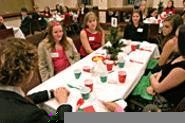
She's truly outdone herself this year.
The room has been done up in contrasting shades of evergreen and wine. On every table sits a miniature Christmas tree, decorated with ornaments that glimmer like diamond-stud earrings. Waiters dressed in suits stand silently at the side, ready to serve the elaborately prepared five-course meal.
Soon the guests start to arrive, stepping carefully out of their parents' minivans and Jaguars. "Bye, Mom, see you at 5," they call as they wave goodbye, their freshly scrubbed faces smelling of Ivory soap.
Hours earlier, these 'tweens had been at basketball games and soccer practices. Now they gather in the back room of the Hudson library to learn the lost art of etiquette. While most 13-year-olds are instant-messaging, these sons and daughters of Cleveland's affluent are learning the proper way to introduce dignitaries.
At the door, the youngsters smooth their hair and stamp the snow off their boots. The girls shrug out of their puffy jackets, revealing frilly, bouncy skirts, velvet camisoles, and elbow-length white gloves. The boys dress in navy blazers, penny loafers, and ties that they instantly loosen.
In the middle of the room, wearing a full, green velvet skirt and matching top, Elizabeth Cochran stands with perfect posture. A piano teacher, Cochran is the director of the Hudson-Stow branch of the National League of Junior Cotillions, an organization that teaches social etiquette. The classes, Cochran says, "help students gain self-confidence and learn to respect one another."
But they also teach children the skills they'll need to navigate the treacherous waters of formal dinner parties and black-tie dances. When the nine-session classes began last year, parents in Hudson, a wealthy suburb north of Akron, rushed to hand over $255 checks.
"My wife and I never received that type of education," explains Robert Feke, an executive at Kintetsu, a freight-carrier company in Middleburg Heights. "It put me at a huge disadvantage when I was going for job interviews. I made a lot of missteps that I only see now, in hindsight. I don't want my daughter to have to go through that."
If Cochran has her way, she won't. On her instructions, the boys escort the girls to their seats, grudgingly offering their elbows and remembering to pull out the chairs.
The meal starts as planned. During the pasta-meatball soup course, the students remember to take small spoonfuls so the contents won't spill. During the spinach-and-pineapple salad course, no leaves catch in the children's teeth, and they resist the urge to drench their greens with dressing.
But then the small goblets of sorbet arrive, and the kids mistake them for bowls of ice cream. Instead of taking delicate bites, they shovel the sorbet into their mouths. When they're done, they set their spoons in the bowls instead of on their napkins, as they're supposed to.
"The youth really started to relax their manners here," Cochran says with a sigh.
At table three, 12-year-old Katherine, whose blond hair has been sprayed into loose, rolling waves, cuts her meat into bite-sized morsels, which she daintily lifts to her mouth. Katherine started attending fancy dinner parties at age four, she says, but even an experienced pro like her occasionally makes mistakes.
"This one time I had a casserole and put this huge chunk of cheese in my mouth all at once, and I couldn't swallow it," she says, giggling. "So I had to go to the bathroom and spit it out, and my mom was so mad."
A few feet away, at table four, 12-year-old Kortney picks at her ham, moving it around her plate, refusing to take a bite. When someone asks what's wrong, she folds her arms across her chest. "We just read Charlotte's Web," she says. "I'm never eating meat again."
After dinner comes the real treat: brownies topped with dollops of whipped cream. First, though, the children must wash their hands.
"As many of you know, in first class nowadays, you'll be handed a steamed cloth at the end of a meal," Cochran says.
Around the room, the kids' heads nod in recognition.
"But sometimes," she continues, "at formal parties, instead of a cloth, you'll have a finger bowl. It's for the fingers, not for the hands."
To demonstrate, Cochran curls her fingertips slightly, as if she's about to play a concert piano, then dips them into a small white bowl filled with water. The children, by contrast, douse their entire hands, as if searching for hidden quarters.
"Remember," Cochran says, "if you're ever in doubt about the correct way to do things, always follow the hosts' lead. They're the most important people in the room."
The students know all about hierarchy. Last month, they learned that during introductions, the most important person is announced first. Unless there's a woman present -- ladies always come first. "Even if she was being introduced to George Bush!" Kortney says.
"But what if you don't know who the most important person in the room is?" someone asks her.
Kortney furrows her brow, as if pondering a difficult math equation. "I'm a bit confused about that one," she admits. "What if one person is, like, the president of the United States? And one is, like, the president of another country? I wouldn't know which one to introduce first. I wouldn't want to insult either of them."
After the meal, the children help Cochran clear and collapse the tables, and carry them to the back room. They thank her for the lesson, then scurry off to play in the snow.
"Mind your dress!" one mother calls from her SUV, but the kids are already tumbling in the snow.

